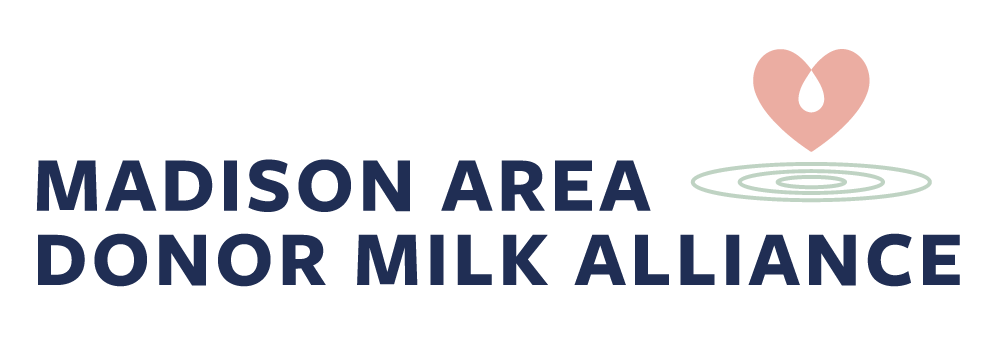Donate Milk
Thank you for considering donating your milk! You have the opportunity to help babies in our community who are in need of milk. We accept milk from donors with infants up to 24 months of age. Fresh refrigerated milk and frozen milk are both accepted. There is no minimum amount required to donate.
Our past donors have had a number of reasons for donating: full freezer, over-supply, and tragic loss. Whatever your reason for reaching out, we will help walk you through the process and answer any questions you might have.
Step one: Email MADMA.donors@gmail.com or call 608.535.9290 (language access/interpreters are available). This phone number is a Google Voice number and does not accept text/SMS messages. Leave a message and a volunteer will respond as soon as we are able.
Step two: download and fill out the Donor History and Statement of Health [PDF]. Digitally sign it and email it to MADMA.donors@gmail.com. En español: Historia del Donante & Declaración de Salud [PDF]. Please also read through this Waiver and Release [PDF].
Step three: schedule an appointment for donor health screening and lab testing.
Step four: drop off your milk.
Requirements:
Donors must follow our Donor Guidelines for Pumping and Handling [PDF] milk.

Frequently Asked Questions
-
Madison Area Donor Milk Alliance (MADMA) is a community based milk-sharing organization facilitated by volunteers. We seek to make milk sharing safer through screening guidelines similar to those used by the Human Milk Bank Association of North America (HMBANA). Midwives licensed in the State of Wisconsin review donor health histories using a Donor History form and draw blood for lab tests for diseases that can be passed through breastmilk. Unlike HMBANA milk banks, we do not thaw, pool, pasteurize, and test donor milk. We provide all families with instructions in easy, evidence-based flash-heat pasteurization at home.
We acknowledge the importance of donor milk from HMBANA milk banks, such as the Mothers’ Milk Bank of Western Great Lakes (MMBWGL). This pasteurized and tested donor milk is available by physician prescription and is an invaluable source of nutrition for babies in Neonatal Intensive Care Units. We support families’ choices regarding milk donation.
-
There is no minimum amount of milk required to become a donor. We gratefully accept any amount of breastmilk. A mother who commits to maintaining her health and pumping her milk is dedicating a precious anD priceless gift, as well as a lot of time and work!
-
As part of the donation screening process, we ask that each donor have blood drawn for HTLV 1&2, HIV 1&2, Hepatitis B, Hepatitis C, and syphilis (RPR). Labs can be obtained through your physician or through Madison Area Donor Milk Alliance.
-
There is no cost to the donor for the lab testing. When a donor has full coverage health insurance, we appreciate the cost savings to MADMA if screening labs can be drawn by the donor's primary provider. For ongoing donors, we offer free milk storage freezer bags.
-
The short answer is yes, usually. Alcohol clears breastmilk at the same rate as it clears the bloodstream. We ask that mothers refrain from collecting milk for donation for 12 hours after drinking alcohol.
-
Most medications are compatible with breastfeeding. Please disclose any over-the-counter or prescribed medications, herbs and supplements. MADMA works on an informed choice model and will inform recipients if milk may contain medications. A recipient has the right to “pass” on any milk offered them.
-
We appreciate receiving frozen donor milk as soon as it becomes convenient. The fresher your milk, the higher its nutritive value. We accept milk that has been safely handled and stored in a refrigerator freezer up to 6 months and in a deep freezer up to 12 months. Please review our Milk Handling Guidelines.
-
Our volunteers typically can respond quickly and arrange transfer of milk in a timely manner. Donor milk will be held for distribution until lab screening is completed. Please note all MADMA facilitators are volunteers with families and other jobs and respond as able.
-
At MADMA, we understand that donating milk after the death of a baby can be a profoundly meaningful focus in bereavement. We are grateful for any amount of milk, whenever it becomes available. We offer to connect bereaved mothers with volunteers who have experienced losses themselves and understand the unique process of pumping, as well as weaning from a pump, after a loss. These volunteers are also familiar with a wide spectrum of bereavement resources. In addition, a bereaved donor who lacks access to a high quality pump can borrow a hospital grade pump from MADMA.
